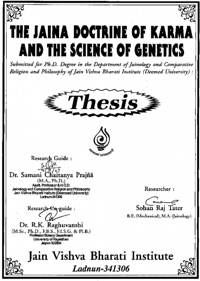Vedanīya karma are classified in two category:
- Sātā Vedanīya karma,
- Asatā Vedanīya karma.
1
Sāta vedanīya karma
This karma causes happiness in the body of living organism.
2
Asātā vedanīya karma
This karma causes unhappiness in the body of living organism.[23]
Vedanīya karma genes
Dopamine chemical is an activator of happiness in behaviour. The break through come from an unexpected quarter: a small research team in Isreal led by Scientist Rechard Ebstein, the laboratory director at the S. Herzog memorial hospital in Jerusalem, and Robert Belmater, an Israeli psychiatrist interested in Schizophrenia, which is thought to involve sever dopamine disruptions. Looking at one after another of the dopamine related genes potentially involved in schizophrenia they noticed one gene that seemed peculiar. It was the gene that makes the DR dopamine receptor called D4DR, a gene of happiness.[24] This can be compared with śātāvedanīya karma.
The interpretation is that the diabetes gene makes the leptin receptor: a brain protein that senses the presence of the fat harmone. If the receptor detects peptin it tell the body to stop eating an start burning fat. When the leptin receptor gene was isolated, first from mice and then from humans, it was found to be located primarily in the hypothalamus, the brain's eating centre. When fat cells are well fed and plump, they produce leptin which goes to the brain and binds to the receptor, which in turn decreases food intake and increases metabolism. Thus the leptin receptor must send signals both within the brain to decrease hunger and to the body to increase metabolism.[25] This can be compared with śātāvedanīya karma.
Around the time team was preparing research study, a research group in Texas claimed to have found a specific gene, coding for the dopamine D2 receptor, associated with alcoholism. It was not known what to make of the study, but it was encouraged because it was another potential connection between genes and behaviour. The mention of this specific gene was intriguing because dopamine is a chemical in the brain thought to play a key role in rewarding dependence and pleasure. We could easily imagine how changes in these pathways might make a person dependent on alcohol.[26] This can be compared as sātāvedanīya karma.
Starting in 1990, the scientific community and the U.S. government initiated a fifteen year $ 3 billion plan called the human genome project. The goal is to precisely map all three billion base pairs, a bits of information, that make up the human genome, which is the complete compliment of genetic information in a single person. The first step was developing genetic markers, which are signpots that indicate the exact position of a piece of DNA on a chromosome. Scientists also were developing ingenious ways to use these markers to map genes even when it was not known what the gene did or where it was located on the genetic make up. They already had used these methods to map genes for several important diseases, such as cystic fibrosis, Huntington's chorea, and one type of colon cancer.[27] This is comparable to asātāvedanīya karma.
Menza, Matthew A, Lawrence, I, Golbe Ronald A, Cody and Nancy E. Forman "Dopamine related personality traits in parkinson's disease" Neurology 43.
Lee, Gwo-Hwa, R. Proenca "Abnormal splicing of the leptin receptor in diabetic mice", Nature 379, 1996.
Blum, K, E.P. noble, P.J., Sheridan 1990, "Allelic association of human dopamine D2 receptor gene in alcoholism". Journal of American medical association, 263.
 Prof. Dr. Sohan Raj Tater
Prof. Dr. Sohan Raj Tater
 Doctoral Thesis, JVBU
Doctoral Thesis, JVBU